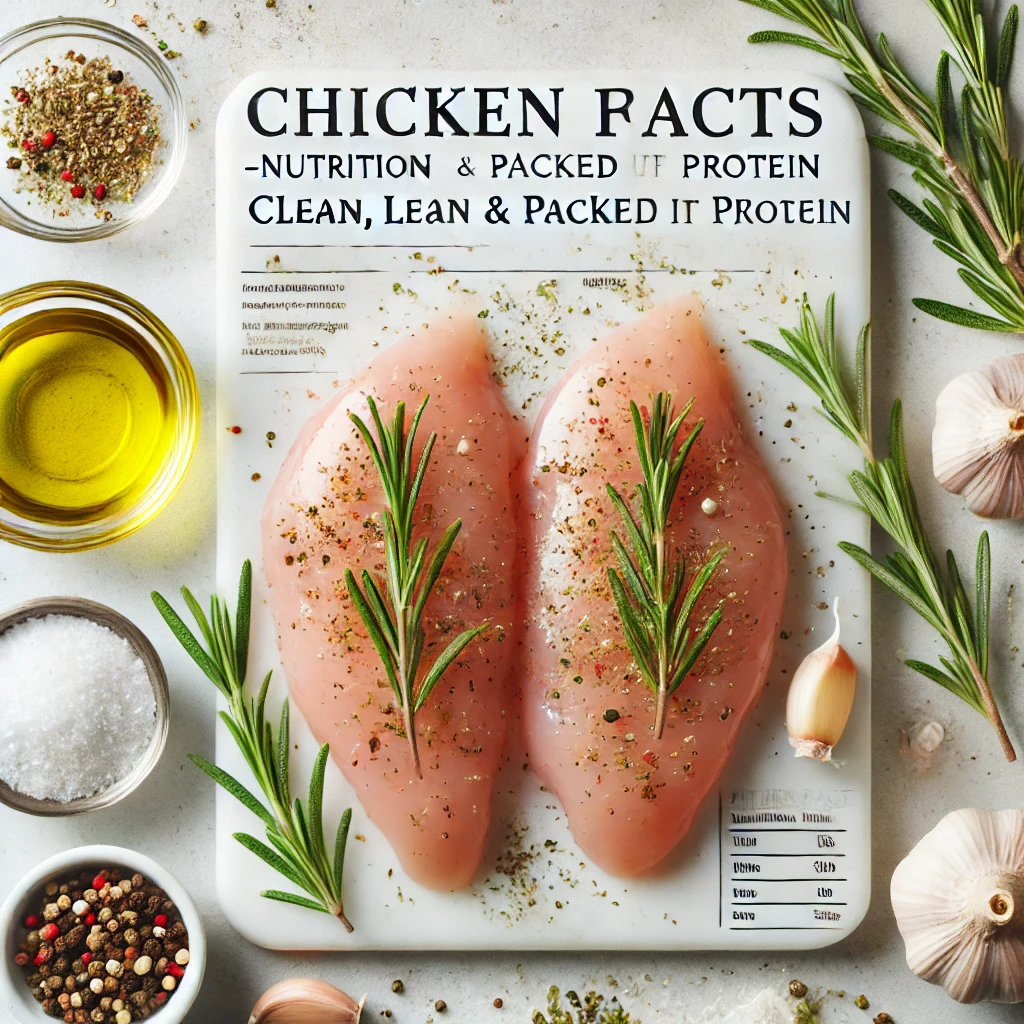Discover the full breakdown of chicken breast nutrition facts, including calories, protein, vitamins, and health benefits. Learn why chicken breast is a top choice for a clean, lean diet.
Why Chicken Breast Nutrition Facts Matter

| Nutrient | Amount (per 100g) |
|---|---|
| Calories | 165 kcal |
| Protein | 31 g |
| Total Fat | 3.6 g |
| Saturated Fat | 1.0 g |
| Cholesterol | 85 mg |
| Carbohydrates | 0 g |
| Fiber | 0 g |
| Sugars | 0 g |
| Sodium | 74 mg |
| Potassium | 256 mg |
| Vitamin B6 | 0.6 mg (30% DV) |
| Niacin (Vitamin B3) | 13.7 mg (86% DV) |
| Selenium | 27.6 mcg (50% DV) |
High Protein, Low Fat: Why Chicken Breast Is a Fitness Favorite
The high protein content in chicken breast is one of its biggest selling points. With 31 grams of protein per 100g serving and very low fat, it’s ideal for muscle growth, recovery, and fat loss.
Key benefits of its protein profile:
- Builds and repairs muscle tissue
- Keeps you full longer (great for weight management)
- Supports metabolism and hormone health
Zero Carbs: Perfect for Low-Carb and Keto Diets
If you’re following a low-carb or keto diet, chicken breast fits right in. It contains zero carbohydrates, making it an easy, versatile addition to any meal plan that focuses on fat-burning or blood sugar control.
Micronutrients That Boost Your Health
Chicken breast is not just about protein — it’s rich in essential vitamins and minerals like:
- Vitamin B6: Vital for brain health and energy metabolism
- Niacin: Helps turn food into energy and supports skin and nerve function
- Selenium: An antioxidant that supports thyroid health and immunity
These nutrients often go unnoticed but play a crucial role in long-term health and vitality.
Chicken Breast vs. Other Meats: How Does It Compare?
Here’s a quick comparison of chicken breast with other popular protein sources:
| Protein Source | Calories (per 100g) | Protein (g) | Fat (g) |
|---|---|---|---|
| Chicken Breast | 165 | 31 | 3.6 |
| Beef (Lean, cooked) | 250 | 26 | 15 |
| Salmon (cooked) | 206 | 22 | 13 |
| Tofu (firm) | 144 | 15 | 8 |
As you can see, chicken breast wins when you’re looking for maximum protein with minimum fat and calories.
How to Cook Chicken Breast for Maximum Nutrition

To keep the nutrition high and fat content low, opt for these cooking methods:
- Grilled
- Baked
- Poached
- Air-fried
Avoid deep-frying or cooking with heavy oils, as this adds unnecessary fat and calories.
Is Chicken Breast Healthy? Final Verdict
Absolutely! With its lean protein, low calories, and nutrient-rich profile, chicken breast is a top-tier choice for anyone focused on health, fitness, or weight management.
Conclusion: Chicken Breast Nutrition Facts Are Worth Knowing
Understanding chicken breast nutrition facts empowers you to make better choices — whether you’re meal prepping, counting macros, or just trying to eat clean.
Add it to salads, stir-fries, wraps, or enjoy it as a main course. It’s flexible, delicious, and a nutritional win on every level.

